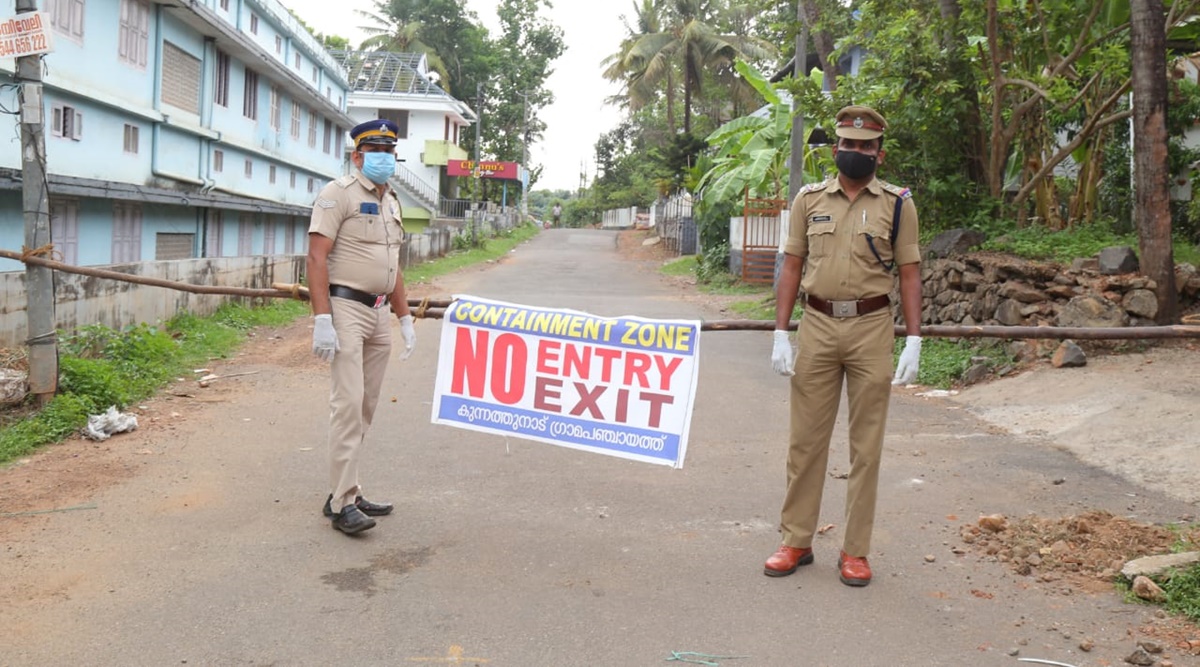 The Kerala government, over the past few days, has tightened the screws on movement of people. (Source: PRD)
The Kerala government, over the past few days, has tightened the screws on movement of people. (Source: PRD) Healthcare experts in Kerala are calling on the state government to lock down the state immediately and focus on enhancing capacities for medical oxygen supply, ICU beds and ventilators to prevent the health infrastructure from being overwhelmed by the rapid surge in Covid-19 infections.
The situation in the state is quite critical with the active caseload having touched three lakh and a test positivity rate hovering above 25%. Daily new infections have crossed 35,000 and six of the 14 districts have over 20,000 persons currently under treatment. Two districts in particular — Ernakulam and Kozhikode — have over 40,000 patients either in home isolation or in hospitals and first-line treatment centres (FLTCs).
With the numbers of those seeking critical care having galloped in the last few weeks, private hospitals, particularly in cities like Kochi and Kozhikode, are running out of oxygen-supported beds, forcing families to run pillar to post in search of treatment.
While the state government, over the past few days, has tightened the screws on the movement of people, especially at night and during weekends, in the form of curfews, it has stopped short of imposing a state-wide lockdown, perhaps taking socio-economic concerns into account. Chief Minister Pinarayi Vijayan said people should go into ‘self-lockdown’ and avoid stepping out except for emergency purposes.
But doctors and experts say it’s not enough.
“The situation will go out of control if we don’t go into a lockdown right now, because it’s a fierce spread. One person is transmitting the virus to multiple people at a very quick speed. On May 2, the votes of Assembly elections are set to be counted and there are likely to be crowds one way or the other. In weddings that are taking place these days, we are hearing reports of 50 per cent of those attending getting infected. So if we break contact between people for more than 10 days, we can reduce the speed of transmission. It’s based on a scientific principle that we have recommended a two-week lockdown,” said Dr P Gopikumar, state secretary of the Indian Medical Association.
On Friday, the government appeared warmer to the idea of declaring a lockdown, at least in districts where the test positivity rate is higher than usual along with alarming caseloads. A decision to that effect, if it happens, is expected to come soon.
“The government rightly has to consider a lot of factors before imposing a lockdown such as socio-economic concerns. But as a scientific body, we recommended a lockdown because that’s what’s needed right now. Only if there is human life, can there be an economy,” said Dr TN Suresh, ENT consultant and general secretary of the Kerala Government Medical Officers Association (KGMOA).
Dr Padmanabha Shenoy, a well-known rheumatologist and public health expert, said the current restrictions imposed by the government have not resulted in visible effects on the infection curve. “It’s been 10 days since the restrictions have been brought in and it’s clear that they have not been effective. At least the infection curve should have stabilised. But the curve is only going up and we are setting new records every day. If the present situation continues, it will lead to an explosion of cases and the collapse of the system,” he said.
“(Imposing a lockdown) is also about whether we are going to have enough beds for the patients that we are diagnosing now. That’s the major question. If 80% of the beds are utilised already, in the next 4-5 days, all our existing beds will be occupied. Already in cities like Kochi, ICU beds in private hospitals are hard to find,” he added.
Dr Amar Fettle, state nodal officer for Covid-19, said efforts on a war footing are on to increase bed capacities with oxygen support with the help of private healthcare chains.
“We are trying to create a reserve of beds just like during the first wave last year. We are taking up unoccupied space of private hospitals and medical colleges. They have allocated 25% of the beds already which may have to be increased. Unless things go very much out of hand, beds will be present. It depends on the volume of people who don’t take care at all (in following protocols). Secondly, even if you start taking care, there will be a lag period of two to three weeks for the impact to come,” he said.
“During the first wave, we had done preparatory works for the first time such as identifying places (to set up hospitals or treatment centres), checking their suitability, finding suppliers for beds, all of this was being done for the first time in history. But this time, every DMO or DPM have contacts of manufacturers (for supplies). So the response time is much less this time,” he added.
To tackle the rising number of persons requiring hospitalisation and prevent deaths for want of treatment, the government has also opened centralised district-level war rooms where teams of personnel will guide patients and their families to hospitals, domiciliary care centres and first-line treatment centres. Dedicated war-rooms for supply of medical oxygen are also being opened.
- The Indian Express website has been rated GREEN for its credibility and trustworthiness by Newsguard, a global service that rates news sources for their journalistic standards.

